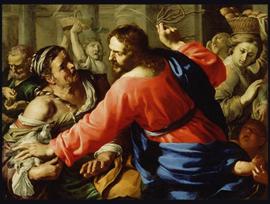Free E-Mail
Bible Studies
Beginning the Journey (for new Christians). en Español
Old Testament
Abraham
Jacob
Moses
Joshua
Gideon
David, Life of
Elijah
Psalms
Solomon
Songs of Ascent (Ps 120-135)
Isaiah
Advent/Messianic Scriptures
Daniel
Rebuild & Renew: Post-Exilic Books
Gospels
Christmas Incarnation
(Mt, Lk)
Sermon on the Mount
(Mt 5-7)
Mark
Luke's
Gospel
John's Gospel
7 Last Words of Christ
Parables
Jesus and the Kingdom
Resurrection
Apostle Peter
Acts
The Early Church
(Acts 1-12)
Apostle Paul
(Acts 12-28)
Paul's Epistles
Christ Powered Life (Rom 5-8)
1 Corinthians
2 Corinthians
Galatians
Ephesians
Vision for Church
(Eph)
Philippians
Colossians,
Philemon
1
& 2 Thessalonians
1 & 2 Timothy,
Titus
General Epistles
Hebrews
James
1 Peter
2 Peter, Jude
1, 2, and 3 John
Revelation
Revelation
Conquering Lamb of Revelation
Topical
Glorious Kingdom, The
Grace
Great Prayers
Holy Spirit, Disciple's Guide
Humility
Lamb of God
Listening for God's Voice
Lord's Supper
Names of God
Names of Jesus
Christian Art
About Us
Podcasts
Contact Us
Dr. Wilson's Books
Donations
Watercolors
Sitemap
Day 19. Who Can Endure the Day of His Coming? (Malachi 3:1-4)
Thursday, Third Week of Advent
 Bernardino Mei, 'Christ Cleansing the Temple' (c. 1655), oil on canvas, 41"x 55.5", J. Paul Getty Museum, Los Angeles. |
Read in the Bible: Malachi 3:1-4
There is a tendency at Christmas to fawn over the cuteness of the Christ Child and the beauty of the moment. To talk about peace on earth and goodwill to men. And that is all good.
But the truth is, the birth of Jesus brings about a major confrontation. Herod recognizes his own peril immediately and tries to kill the Child. Satan realizes the hazard to his power and tries to corrupt Jesus. And the Jewish leaders became aware that Jesus threatened their cozy compromise with power, and thus conclude that he has to be killed.
Yesterday, we read that the Child in the manger is the Lord of All Creation. Today's reading reminds us that Jesus comes with demands upon us and our way of life.
The Two Messengers (Malachi 3:1)
The prophet Malachi tells us that two messengers will come.
"'See, I will send my messenger,136 who will prepare the way before me. Then suddenly the Lord you are seeking will come to his temple; the messenger of the covenant, whom you desire, will come,' says the LORD Almighty." (Malachi 3:1)
These are:
- The messenger who prepares the way, and
- The messenger of the covenant.
1. The Messenger Who Prepares the Way
The first messenger gets ready or prepares137 for the second. We know him as John the Baptist.138 John's message is to
"Make
straight in the wilderness a highway for our God.
Every valley shall be raised up,
every mountain and hill made low;
the rough ground shall become level,
the rugged places a plain." (Isaiah 40:3b-4)
What a clear image of major road work to prepare the King's highway -- straightening the curves, as well as cutting and filling so that the road might be level and easy to travel upon. Major roadwork -- that's what's ahead for us would-be disciples on this journey with Jesus. And preparing our hearts for the king begins with repentance.
2. The Messenger of the Covenant
The second messenger Malachi points to is the messenger of the covenant.
"Then suddenly the Lord you are seeking will
come to his temple;
the messenger of the covenant, whom you desire,139
will come,'
says the LORD Almighty." (Malachi 3:1b)
When I read this verse my mind goes to the bass recitative in Handel's "Messiah," followed by the bass aria and chorus putting these powerful verses to music, with the question:
"Who shall stand when he appeareth? ....
For He is like a Refiner's Fire."
Malachi 3:1 tell us that the Lord whom the people claim to be seeking will suddenly140 come to his temple. When I was in the U.S. Army, we often had advance notice of company inspections so we could get ready for them. But woe to us if the officer entered the barracks suddenly, without warning and we were unprepared! This passage says the Lord is coming "suddenly."
Malachi 3:1b is an important Messianic prophecy that seems to have been fulfilled when Jesus comes to the temple following his Triumphal Entry (Mark 11:15-18).
In what sense is Jesus the "messenger of the covenant"? In Malachi as in New Testament times -- and our time -- the people have broken God's covenant with them, counting it as nothing. Now the Messenger of the Covenant comes suddenly to call them to account. John the Baptist calls for repentance. Jesus comes proclaiming, "The time is come. The kingdom of God is at hand. Repent and believe the gospel" (Mark 1:15). Repentance is John's message. Repentance is Jesus' message. Dear friends, without repentance there is no forgiveness, no grace. Repentance is the first step to restoration.
When we understand the real meaning of the Christmas event, Emmanuel, God with us, we will either bow in repentance and faith before the King, or seek to justify our own sins, and ultimately silence him. There is no middle ground. We say we desire or delight in him (in the words of Malachi 3:1). Our actions will demonstrate if this is actually true.
"Who can endure the day of his coming?
Who can stand when he appears?
For he will be like a refiner's fire or a launderer's soap." (Malachi 3:2)
His judgment will be swift and thorough. A refiner's fire uses bellows to heat it super-hot, hot enough to melt metallic ores. Fuller's soap is a caustic alkali designed to loosen and remove dirt.141
 Also available in book formats: PDF, Kindle, and paperback. |
Who can "abide" (KJV) or "endure" (NIV, NRSV, ESV) such judgment? Who can stand when he comes? No one. Rather we must kneel and let him do his refining work in us. The process may well be painful, but the fruit will be sweet. The writer of Hebrews exhorts us:
"For the moment all discipline seems painful
rather than pleasant,
but later it yields the peaceful fruit of righteousness
to those who have been trained by it." (Hebrews 12:11)
Do your refining work in us, O Lord!
Prayer
Lord, when we stand before you in your holiness and justice, we are guilty and unworthy of your love. But somehow you do love us after all. You love us so much you are willing to die a shameful and horrible death for us. And now you offer friendship and fellowship. Lord, we repent. Help us to walk with you in true friendship, and cleanse us as we go. In your holy name, we pray. Amen.
Discussion Question
Q19. (Malachi 3:1-4). Why is the suddenness of Christ's
coming so fearful? How were these verses fulfilled in Jesus' day. How will they
be fulfilled at his coming?
https://www.joyfulheart.com/forums/topic/2093-q19-messengers/
Endnotes
[136] "My messenger" in verse 1 is malʾākî, transliterated, "Malachi." However, the prophet isn't speaking of himself, but a future messenger of Yahweh, "who will prepare the way before me."
[137] "Prepare" is the Piel stem of pānâ, "turn." However, in the Piel stem means, "get rid of, clear up." Here and in Isaiah 40:3; 57:14; 62:10 with the noun "way, road" (derek) it means, "clear (the way)" ( Holladay, Hebrew Lexicon, p. 293). In verse 1a there is a wordplay: pannû ("clear") with pânîym (literally, "before my face").
[138] Matthew 11:10; Malachi 4:5; Luke 1:76; Matthew 11:14; 17:10-13; Matthew 3:1-3; John 1:23.
[139] The phrase "whom you desire" (NIV), "in whom you delight" (ESV, NRSV, KJV) uses the adjective ḥāpēṣ, "delighting in, having pleasure in," from ḥāpēṣ, "take delight in, feel great favor towards" (Leon J. Wood, TWOT #712a).
[140] Pitʾōm means "suddenly, surprisingly." Of the 25 uses of this word in the prophets and writings only once does it refer to a pleasant event. Elsewhere it is connected with disaster or judgment (Victor P. Hamilton, TWOT #1859a).
[141] "Refiner" in verse 3a is uses the verb ṣārap, "smelt, refine, test" (TWOT #1972).
Copyright © 2025, Ralph F. Wilson. <pastor![]() joyfulheart.com> All rights reserved. A single copy of this article is free. Do not put this on a website. See legal, copyright, and reprint information.
joyfulheart.com> All rights reserved. A single copy of this article is free. Do not put this on a website. See legal, copyright, and reprint information.
 |

|
In-depth Bible study books
You can purchase one of Dr. Wilson's complete Bible studies in PDF, Kindle, or paperback format -- currently 48 books in the JesusWalk Bible Study Series.
Old Testament
- Abraham, Faith of
- Jacob, Life of
- Moses the Reluctant Leader
- Joshua
- Gideon
- David, Life of
- Elijah
- Psalms
- Solomon
- Songs of Ascent (Psalms 120-134)
- Isaiah
- 28 Advent Scriptures (Messianic)
- Daniel
- Rebuild & Renew: Post-Exilic Books
Gospels
- Christmas Incarnation (Mt, Lk)
- Sermon on the Mount (Mt 5-7)
- Luke's Gospel
- John's Gospel
- Seven Last Words of Christ
- Parables
- Jesus and the Kingdom of God
- Resurrection and Easter Faith
- Apostle Peter
Acts
Pauline Epistles
- Romans 5-8 (Christ-Powered Life)
- 1 Corinthians
- 2 Corinthians
- Galatians
- Ephesians
- Philippians
- Colossians, Philemon
- 1 & 2 Thessalonians
- 1 &2 Timothy, Titus
General Epistles
Revelation
Topical
